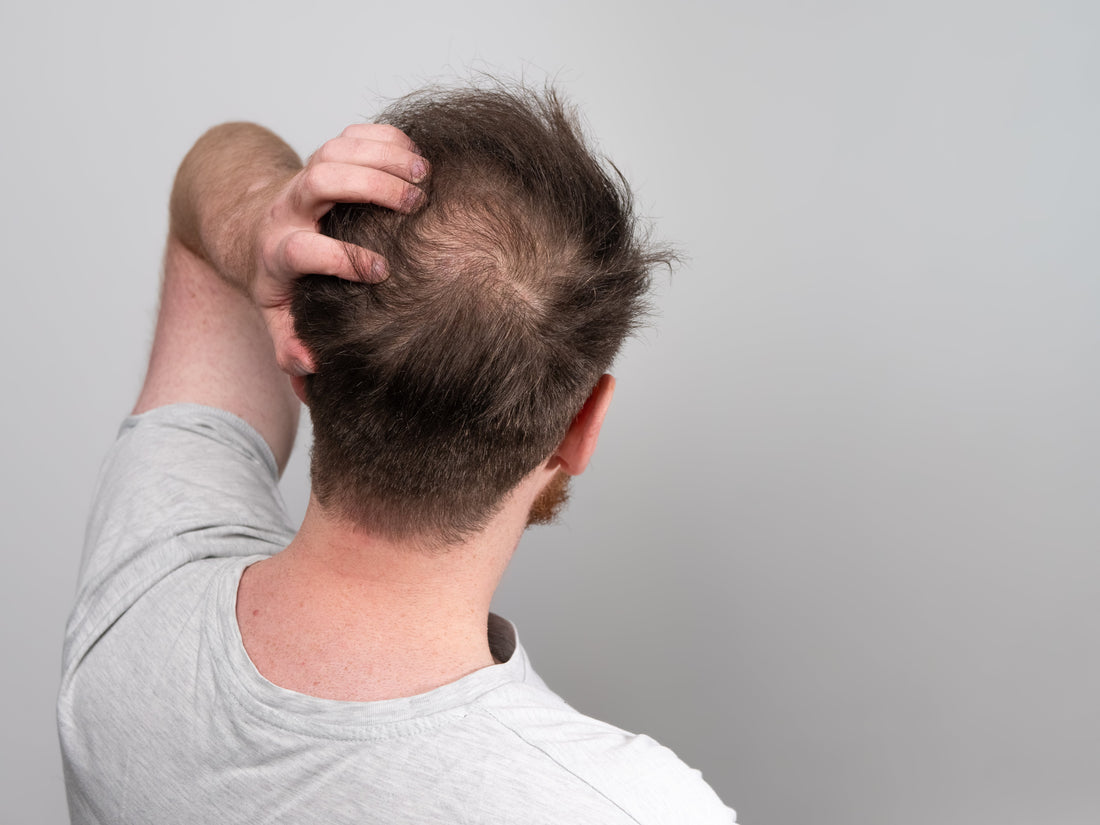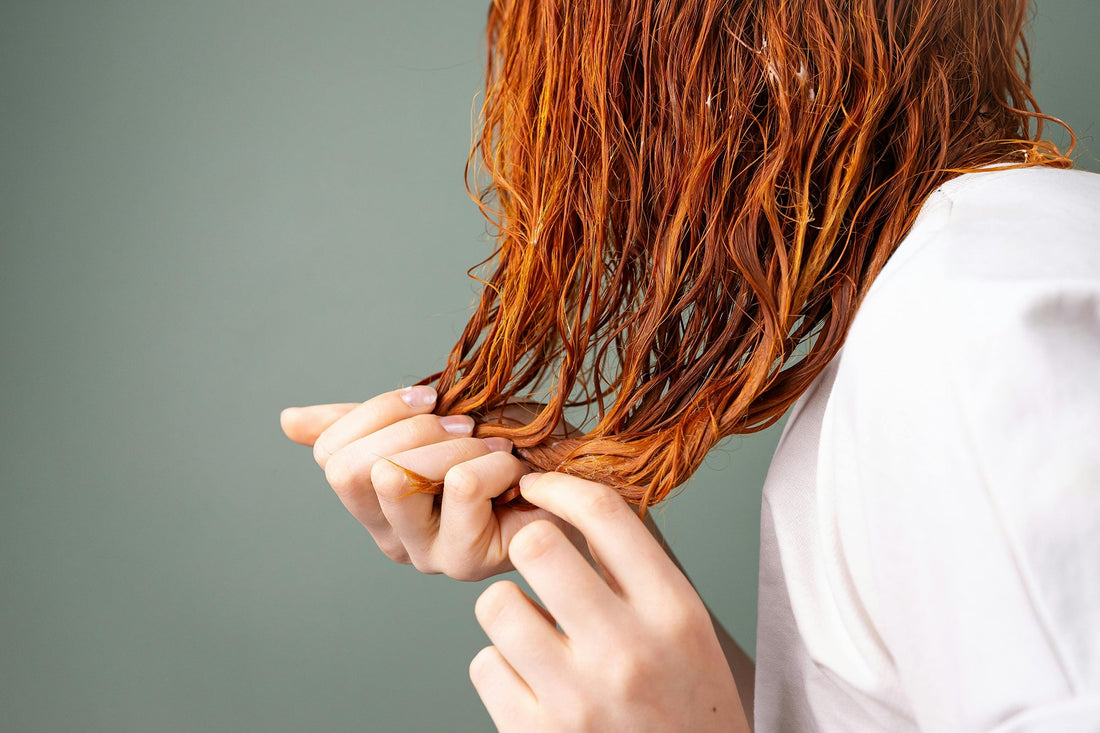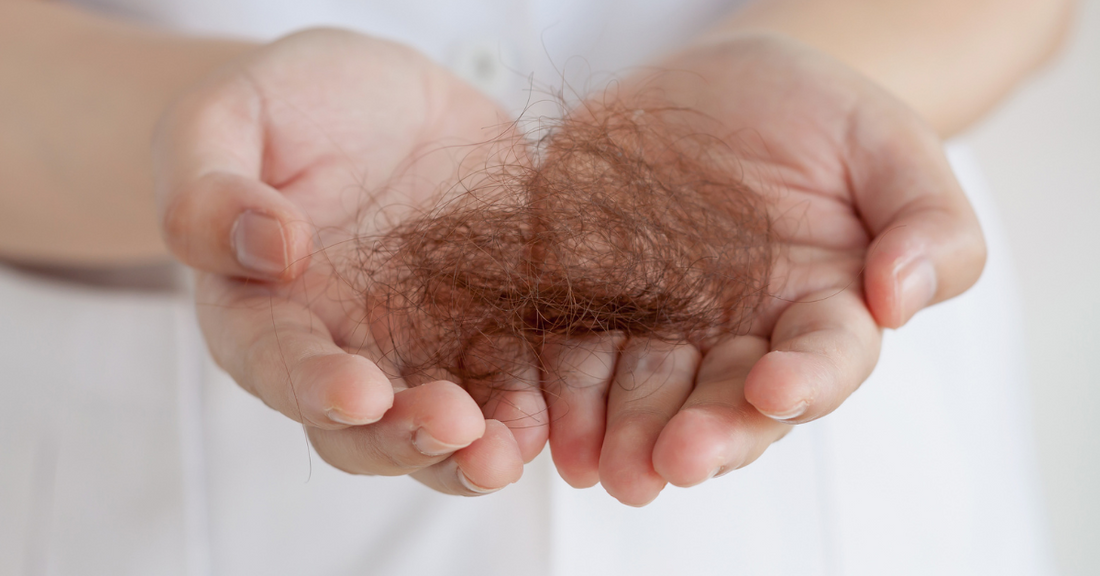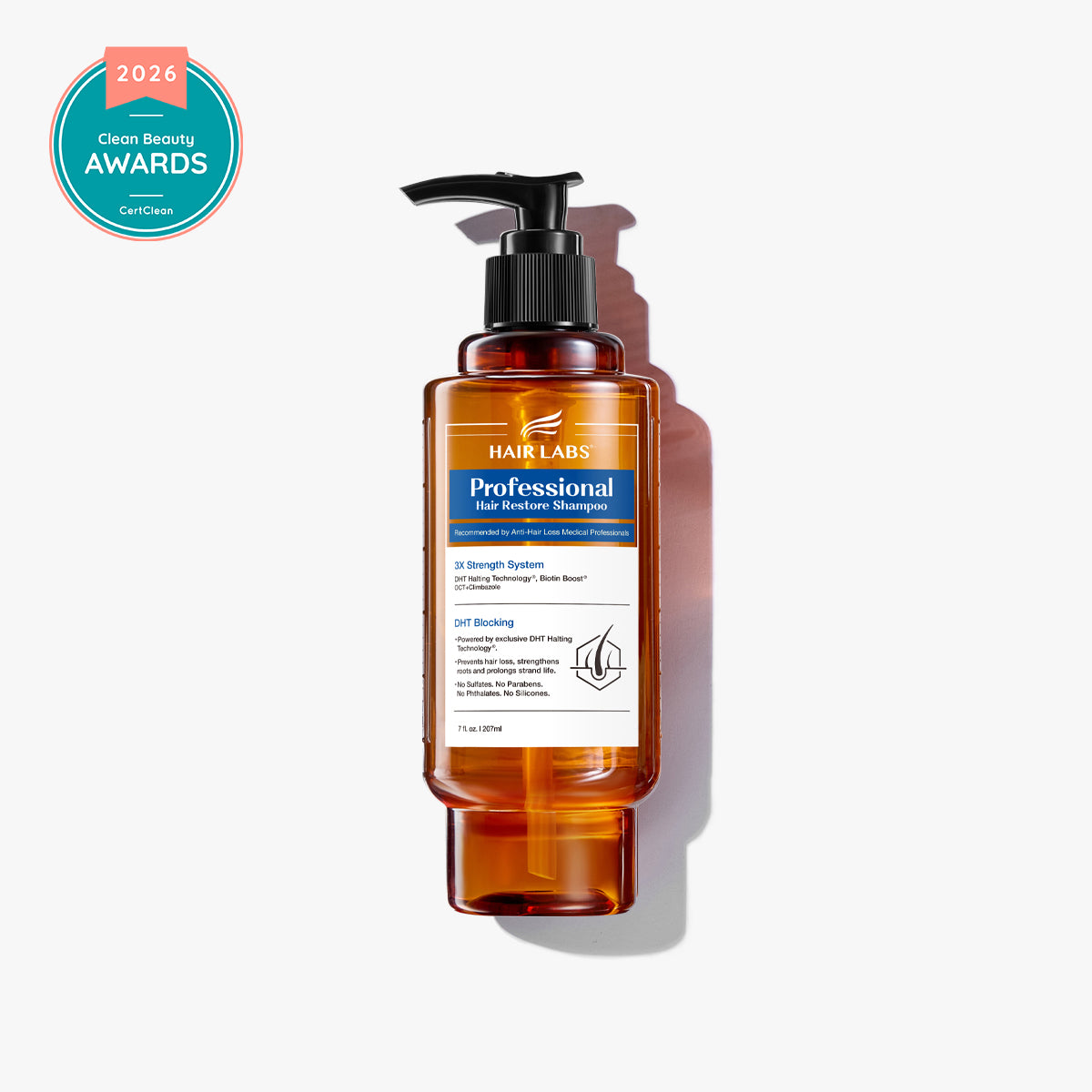Biotin (also referred to as vitamin B7) is a water-soluble B-vitamin that is essential for bodily functions such as energy metabolism, nerve function, and cell growth. Over the last few years, Biotin has become incredibly popular for its potential to promote hair growth and improve the health of skin and nails.
The substance known as Biotin occurs naturally in everyday foods like as eggs, nuts, and certain vegetables. Many people are however turning to biotin supplements in order to help address hair loss.
See: How stress causes hair loss
In this article, we delve into the world of biotin and how it can work wonders for your locks. Get ready to learn about the optimal dosage, the potential side effects to watch out for, and alternative remedies that can help you achieve a luxurious mane. Say goodbye to lackluster hair and hello to your best hair days yet!
How Biotin Works

Biotin is plays a crucial role in several bodily functions, including the following:
-
Energy & metabolism - it is a coenzyme that helps break down fats, proteins, and carbohydrates in food in order to provide energy for the body.
-
Nerve function - required for the production of myelin, a protective layer that surrounds nerve cells. Myelin in turn helps transmit nerve impulses throughout the body.
-
Cell growth – because it is essential for DNA replication and cell division, Biotin plays an important role in the growth and repair of body tissues.
When it comes to hair growth, biotin is believed to have a number of beneficial effects:
-
Keratin production – helps promote the production of Keratin, a protein that makes up the structure of hair, skin, and nails (and is thus essential for healthy hair growth).
-
Stimulates hair follicles - Biotin may help stimulate hair follicles and boost the production of new hair cells (which in turn leads to thicker and stronger hair).
-
Prevent hair breakage - helps improve the elasticity of hair, making it less prone to breakage and damage.
Note: Although genetics, hormonal imbalances, and underlying medical conditions do also influence hair growth, there is no denying the powerful benefits of biotin. While it may not be a miracle cure, biotin has been shown to promote healthier, fuller, and stronger hair. By adding biotin to your daily routine, you can give your hair the boost it needs to reach its full potential.
Research on Biotin and Hair Growth

Scientific studies have explored the correlation between biotin supplementation and hair growth, and there is a growing body of research that supports the benefits of biotin for promoting healthy hair. From reducing hair thinning to improving hair strength and shine, biotin has been shown to play a vital role in maintaining overall hair health.
-
In a small study published in the Journal of Clinical and Aesthetic Dermatology, 18 participants with thinning hair were given a biotin supplement for 90 days. Once the study was concluded, all the participants experienced noticeable improvements in hair density and thickness.
-
Another study published in the Journal of Nutritional Science and Vitaminology found that women with thinning hair who took a biotin supplement for six months recorded significant improvements in hair growth and thickness compared to a placebo group.
-
A 2017 systematic review of the existing research on biotin and hair loss found that while there is some evidence to support the use of biotin for hair growth, it may be even more helpful for improving hair health and reducing hair breakage.
While some experts have pointed out limitations in previous research, such as small sample sizes and a lack of control groups, it is important to note that there is a growing body of evidence that supports the link between biotin and hair health. It is true that biotin is just one of several nutrients that play a role in promoting healthy hair growth, but studies have shown that it can have a significant impact on hair thickness, strength, and overall health. As with any area of scientific research, more studies are needed to fully understand the effects of biotin on hair health. However, the current evidence suggests that biotin is a valuable nutrient to consider for anyone looking to improve the health and appearance of their hair.
Recommended Biotin Doses
One question that people often have is ‘how much biotin should I take’. Well, the recommended daily dosages vary depending on age, sex, and overall health. Furthermore, biotin can be obtained through the diet and supplementation may only be necessary for people with a deficiency or those who are not able to consume enough through their diet.
It is still important to note that while there is no established Recommended Dietary Allowance (RDA), the National Institutes of Health (NIH) has suggested adequate intake levels based on age and gender.
-
Infants 0-6 months: 5 mcg/day
-
Infants 7-12 months: 6 mcg/day
-
Children 1-3 years: 8 mcg/day
-
Children 4-8 years: 12 mcg/day
-
Children 9-13 years: 20 mcg/day
-
Adolescents 14-18 years: 25 mcg/day
-
Adults 19 years and older: 30 mcg/day
Is 10000 Mcg Of Biotin Too Much?
Biotin is a water-soluble vitamin that is generally considered safe to take at doses higher than 30 mcg per day. In fact, according to the Mayo Clinic, up to 10,000 mcg per day of biotin is considered safe for most individuals. Biotin is excreted from the body through urine, which means that any excess amounts are eliminated and do not accumulate in the body. However, it is important to note that taking high doses of biotin can interfere with certain lab tests, so it is recommended to inform your healthcare provider if you are taking biotin supplements. While biotin is generally safe, it is always best to consult with a healthcare professional before starting any new supplement regimen.
Biotin Dosage Safety
It is true that the safety of very high doses of biotin has not been fully established, and more research is needed to fully understand the long-term effects of biotin supplementation. However, it is important to note that biotin has a low risk of toxicity, and side effects are rare at normal dosages. As with any supplement, it is always best to follow the instructions on the bottle and exercise caution when taking high doses. To ensure your safety, it is recommended to speak with a healthcare professional before starting any new supplement regimen. By taking these general safety precautions, you can enjoy the potential benefits of biotin while minimizing any potential risks.
-
Stick to the recommended dosage - avoid taking more than the recommended dosage of biotin, unless instructed to do so by a healthcare provider.
-
Be consistent – make sure to take biotin supplements at the same time each day to maintain consistent levels in your body.
-
Take with food - biotin supplements are best absorbed when taken with a meal or snack that contains fat.
-
Be cautious with other supplements or medications – keep in mind that biotin supplements may interact with other supplements or medications, such as anticonvulsants and antibiotics. Speak with a healthcare provider before taking biotin if you are also taking other supplements or medications.
Potential Side Effects of Biotin

Biotin is generally safe especially when taken in recommended dosages. However, like with any other supplement, there are potential risks and side effects associated with taking biotin. These include the following:
-
Skin reaction - some people may experience skin reactions such as hives, rashes, and acne as a result of biotin supplementation, including rashes, hives, and acne. These side effects are however rare and are more likely to occur in individuals who have a sensitivity to either biotin or some of the other ingredients included in the supplement.
-
Interference with lab tests - high doses of biotin could interfere with certain lab tests, including thyroid function tests and tests for heart disease. This can lead to false results and misdiagnosis.
-
Interaction with medications - biotin supplementation can interact with medications such as anticonvulsants and antibiotics - affecting their absorption and effectiveness. If you are taking any medication, make sure to speak with your healthcare provider before supplementing with biotin.
-
Risk of toxicity - taking very high doses of biotin supplements can lead to toxicity, symptoms of which include skin rash, digestive upset, and neurological upset such as numbness and tingling in the extremities, so stick to the recommended dosages.
Note: While some individuals may experience side effects when taking biotin supplements, it is important to note that these occurrences are rare. The vast majority of people who take biotin do not experience any adverse effects. Biotin is generally well-tolerated at recommended doses and is considered safe for most individuals. By following the recommended dosage and exercising caution, you can safely enjoy the potential benefits of biotin.
Other Natural Remedies for Hair Growth
Other natural remedies that can help support healthy hair growth include additional vitamins, supplements, herbal remedies, and lifestyle changes:
-
Vitamins and supplements - Vitamin D, vitamin E, iron, zinc, and omega-3 fatty acids can all help ensure healthy hair growth. Taking a daily multivitamin or supplement that contains these nutrients may help support healthy hair growth.
-
Herbal remedies - some herbal remedies may help promote hair growth, although the effectiveness of these is subject to debate. Some herbal candidates that have been mentioned include saw palmetto (often used to treat hair loss in men), and horsetail (which is rich in silica and may help to strengthen hair).
-
Lifestyle changes – changing certain aspects of lifestyle may also help promote healthy hair growth. Some welcome changes include eating a healthy, balanced diet that is rich in protein and nutrients, reducing stress, getting enough sleep, and avoiding harsh chemical treatments and heat styling.
Combined with biotin supplementations, these natural remedies can go a long way to ensure that you have healthy, flourishing hair. Some individuals have obtained impressive results by developing your hair regimen that integrates both internal and external interventions. Below are some practical tips to bring into practice:
-
Take our biotin supplement daily based on your correct dosage level.
-
Use our biotin shampoo regularly to help cleanse and nourish your hair and scalp.
-
Consider adding other natural remedies, such as vitamins and supplements, herbal remedies, and lifestyle changes, to your hair care regimen for maximum benefits.
-
Be patient and consistent because it may take several weeks or months to see noticeable results.
Conclusion on How Much Biotin to Take
Biotin supplements and shampoos are a recommendable choice for anyone who’s looking to address hair loss as well as promote optimal hair growth. Although the scientific evidence supporting the use of biotin as an aid to hair growth is still in its infancy, many users have reported positive and incredible results. Just make sure to adhere to the recommended dosage and craft a comprehensive hair care regimen that also prioritizes personal care and lifestyle changes.







